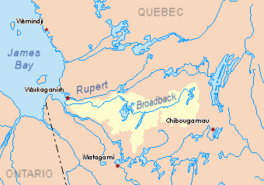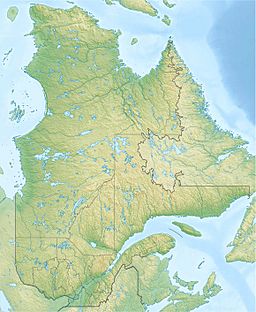Théodat Lake facts for kids
Quick facts for kids Théodat Lake |
|
|---|---|

Broadback River basin in yellow
|
|
| Location | Baie-James |
| Coordinates | 50°54′26″N 76°09′13″W / 50.90722°N 76.15361°W |
| Type | Natural |
| Primary inflows | Théodat River |
| Primary outflows | Théodat River |
| Basin countries | Canada |
| Max. length | 20.1 kilometres (12.5 mi) |
| Max. width | 8.0 kilometres (5.0 mi) |
| Surface elevation | 283 metres (928 ft) |
| Islands | 43 |
Théodat Lake is a freshwater lake located in the Baie-James area of Quebec, Canada. This region is part of Nord-du-Québec. The lake is a natural body of water.
You can reach the area around Théodat Lake by using a forest road that starts from Matagami. This road goes along the west side of Evans Lake. The lake's surface is usually frozen from early November until mid-May. It is generally safe to travel on the ice from mid-November to mid-April.
Contents
Discovering Théodat Lake's Features
Théodat Lake is quite large, stretching about 20.1 kilometres (12.5 mi) long. It has a unique shape, like an anchor lying down. At its widest point, the lake measures 8.0 kilometres (5.0 mi) across. It sits at an elevation of 283 metres (928 ft) above sea level.
Islands and Water Flow in Théodat Lake
This lake is home to many interesting features, including numerous bays and peninsulas. It also has about 43 islands! The Théodat River flows through the western part of the lake.
Water enters Théodat Lake from several places. The Théodat River feeds into its eastern side. Other streams also bring water from nearby lakes and a marshy area to the north. The water then flows out of Théodat Lake from a bay on its western side, continuing into Le Gardeur Lake.
Where is Théodat Lake Located?
The mouth of Théodat Lake, where its water flows out, is found at the end of a bay on the west bank. Here are some distances to help you imagine its location:
- It is 22.2 kilometres (13.8 mi) east of where the Théodat River ends.
- It is about 158 kilometres (98 mi) northeast of the center of Matagami.
- It is 100 kilometres (62 mi) northeast of Soscumica Lake.
Rivers and Lakes Near Théodat Lake
Many other rivers and lakes are close to Théodat Lake. These are part of the same water system.
- To the North: Legoff Lake, Marte River, Nemiscau River.
- To the East: Lake Tésécau, Lake Camousichouane.
- To the South: Broadback River, Salamandre River, Nipukatasi River.
- To the West: Evans Lake, Chabinoche River.
The Story Behind Théodat Lake's Name
Théodat Lake has had many different names over the years. People have called it by various names since the early 1900s.
Early Names of the Lake
In 1911, a map of Quebec by James White called this lake "L. Geikie." No one knows for sure where that name came from. A book about Quebec's rivers and lakes in 1914 also used "Lake Geikie." By 1925, the same book called it "Lake Eikie."
Later maps, published between 1924 and 1940, referred to it as "L. Mill." Then, in the 1930s and 1940s, maps called it "Mishagomish Lake." This name comes from the Cree language and means "large expanse of water."
Choosing a New Name
By 1945, the Geography Commission, a group that names places, decided to pick a final name for both the lake and the river. They wanted a completely new name, not one of the old ones. This was because some of the old names, like Michagomiche (a French version of Mishagomish), were too similar to other place names in the area.
The Name "Théodat" is Chosen
Two years later, in 1947, the Geography Commission chose the name "Théodat" for the lake and its river. This name honors Gabriel Sagard, who was also known as Théodat. He was a Recollet brother and a missionary who visited the Huron people in Canada in 1623 and 1624.
Gabriel Sagard was born between 1590 and 1595 and passed away in France around 1636. He was a reliable observer of his time. He wrote down what he saw in books like "The Great Voyage of the Huron Country" (1632) and "Histoire du Canada" (1636). He also created a "Dictionary of the Huron Language." Many consider him to be the first religious historian of Canada.
The name "Lake Théodat" officially became recognized on December 5, 1968, by the Commission de toponymie du Québec, which is the official naming board for Quebec.
 | Shirley Ann Jackson |
 | Garett Morgan |
 | J. Ernest Wilkins Jr. |
 | Elijah McCoy |


